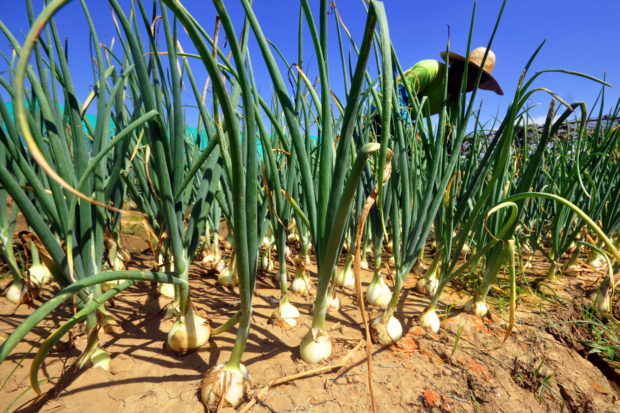
GOLD ONIONS A Pangasinan farm worker attends in 2016 to a plot of white onions that are now rare in Metro Manila.
—INQUIRER FILE PHOTO
The Agricultural Competitiveness Enhancement Fund (ACEF) collected from agricultural tariffs now stands at P4.4 billion as of August, bringing to more than P15 billion the amount available for the agricultural sector next year.
The P4.4-billion ACEF is on top of the P10 billion for the Rice Competitiveness Enhancement Fund (RCEF) and additional P1 billion in assistance to farmers and fisherfolk that the Marcos administration has already included in its P5.268-trillion spending plan for 2023.
This emerged as the House of Representatives’ committee on agriculture and food, chaired by Quezon Rep. Wilfrido Mark Enverga, approved for second reading House Bill No. 2385 extending ACEF’s life until 2028.
If HB 2385 is approved, it will be the third extension of the ACEF, which was enacted into law in 1996 as part of the Agricultural Tariffication Act (Republic Act No. 8178) that lifted import bans on onions, potatoes, garlic, cabbages, coffee and tobacco leaf and implemented in-quota tariffs for agricultural produce.
ACEF’s life was first extended until 2015 (RA 9496) and again until 2022 (RA 10848).
But Enverga tacitly conceded in the explanatory note of HB 2385 that safety nets for those affected by tariffication, or the Minimum Access Volume system, have not accomplished their purpose, even after 26 years.
“The reason, for which ACEF was created more than 20 years ago, on how to make our agriculture competitive remains valid and relevant in the challenging years ahead,” he said.“What is needed is not to write the requiem for ACEF, but a law reforming and extending its validity to help farmers and fisherfolk improve their productivity and competitiveness,” he added.
Debugged of corruption
Enverga said the ACEF has been “debugged of its corruptive and corrosive practices,” pointing out that stringent safeguards have been put in place to ensure that only legitimate farmers and fisherfolk benefit from the fund.
According to Department of Budget and Management Secretary Amenah Pangandaman, the 2023 budget already includes a P10-billion allocation for the RCEF, another tariffication law passed during the Duterte administration.
There are also allocations totaling P1 billion as assistance to farmers and fisherfolk who were devastated by the Duterte administration’s agricultural importation policies that have also weakened national food security.The P1-billion fund will be divided into P510.45 million in the budget of the Department of Agriculture for corn farmers and P489.6 million in the budget of the Bureau of Fisheries and Aquatic Resources.
“The 2023 budget for assistance in the agriculture sector is doubled from P500 million this year,” Pangandaman told senators at a briefing of the Development Budget Coordination Committee in September.
This is for the provision of fuel discounts to qualified farmers and fisherfolk who own and operate agricultural and fishery machinery, but that is also based on fuel prices over a month ago. INQ
RELATED STORY: